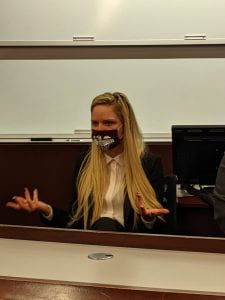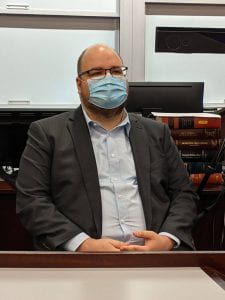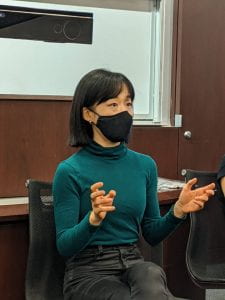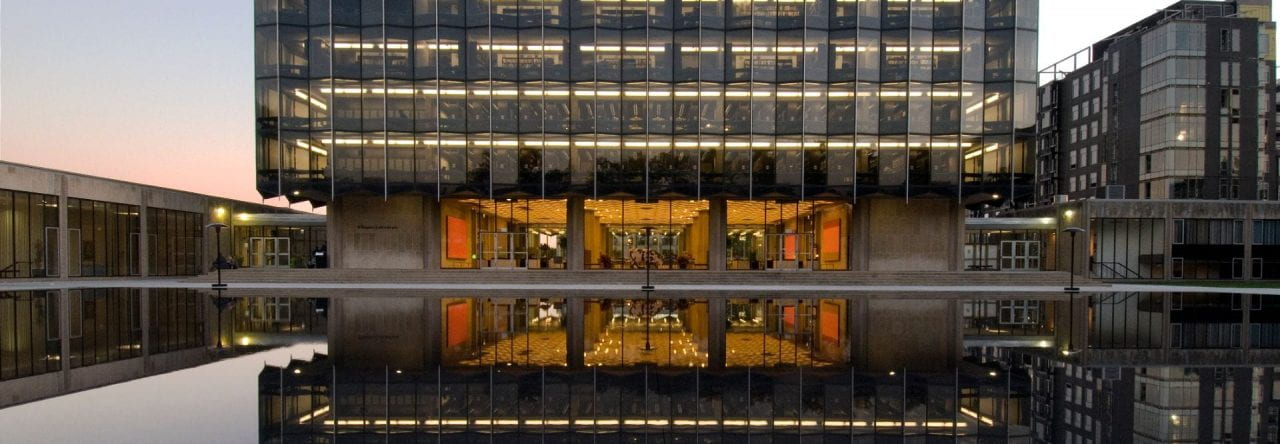 By So Jung Kim, ’23
By So Jung Kim, ’23
In celebration of Pro Bono Week at the law school, three students—Rob Clark (’22, previously spotlighted), Jacqueline Horwitz (’22), and Jennifer Yang (’23)—who are actively engaged in impactful pro bono work spoke as part of a panel about their experiences getting involved with various nonprofits and legal initiatives.
To illustrate the breadth of the panelists’ early pro bono involvement, they have conducted intake at Legal Aid Chicago’s Woodlawn Clinic (pre-pandemic), just steps from the law school building; served as a live chat helper for Illinois Legal Aid Online; conducted research for the Louisiana Capital Assistance Center through Spring Break of Service; and answered legal-inquiry letters from incarcerated LGBTQ people through Black and Pink. These projects helped them to develop skills in research, writing, communicating with clients and legal counsel, as well as learn more about substantive legal systems in Illinois and across the country.
 Pro bono work is serious work that impacts real people’s lives, as demonstrated by a few anecdotes. This summer, Jacqueline answered a call for assistance to support intake on bases for Afghan refugees who fled the regime change after the American military withdrawal. She was deployed alongside litigators, who were also new to immigration law, to the East Coast to receive new arrivals and let them know about their rights and the resettlement process. Because of the urgency of the situation, sometimes they served as social workers providing backpacks and pregnancy tests or mobilizing other resources for families.
Pro bono work is serious work that impacts real people’s lives, as demonstrated by a few anecdotes. This summer, Jacqueline answered a call for assistance to support intake on bases for Afghan refugees who fled the regime change after the American military withdrawal. She was deployed alongside litigators, who were also new to immigration law, to the East Coast to receive new arrivals and let them know about their rights and the resettlement process. Because of the urgency of the situation, sometimes they served as social workers providing backpacks and pregnancy tests or mobilizing other resources for families.
 During his internship with the Center for Disability and Elder Law, Rob worked directly with clients to assist with estate planning, property tax exemptions, and many other legal issues. He often worked with clients facing complex problems and was responsible for spotting and helping to resolve underlying legal issues that the clients might not have been aware were contributing to their problems.
During his internship with the Center for Disability and Elder Law, Rob worked directly with clients to assist with estate planning, property tax exemptions, and many other legal issues. He often worked with clients facing complex problems and was responsible for spotting and helping to resolve underlying legal issues that the clients might not have been aware were contributing to their problems.
Jennifer started volunteering with the Northwest Immigrant Rights Project in Seattle before law school as a translator. Her role was to ensure the accuracy of documents, testimony, and conversations—across languages—between the lawyer and the client seeking asylum. She reflected on how much of a difference it made to let the client know she believed their story, understood the cultural context, and wanted to get their story straight to be their best advocate and eventually obtain a positive outcome for the client.
Pro bono experiences are also a professional development opportunity that prepares students for summer internships and jobs in law firms or the public sector. In addition, they let students explore their own interests, realize which areas they may find less exciting early on, and focus on skillsets of best fit (e.g., transactional law, litigation, policy and/or appellate advocacy, direct services, impact litigation). It can also signal to employers that students are capable of juggling competing deadlines.
As co-president of the Public Interest Law Society, one of Jennifer’s priorities this year is to build in group opportunities for PILS members to participate in pro bono together and foster more connection across class years. Nevertheless, 1Ls should not be afraid to volunteer for work because they may feel too new to the law. Sometimes lessons from first-year doctrinal classes may appear in real life and deliver results for the clients. Host organizations are the experts and prepared to train pro bono volunteers (e.g., manuals, slide decks, shadowing an attorney, templates from past work) and give them work that they can handle. Mostly, they want students’ willingness to learn and problem-solving skills. Indeed, many legal aid organizations have dual missions to serve their clients’ immediate needs and also to integrate pro bono work into the legal profession. Regardless of the onboarding process, panelists recommended asking questions and seeking feedback early and often on assignments, but after doing some due diligence first.
year is to build in group opportunities for PILS members to participate in pro bono together and foster more connection across class years. Nevertheless, 1Ls should not be afraid to volunteer for work because they may feel too new to the law. Sometimes lessons from first-year doctrinal classes may appear in real life and deliver results for the clients. Host organizations are the experts and prepared to train pro bono volunteers (e.g., manuals, slide decks, shadowing an attorney, templates from past work) and give them work that they can handle. Mostly, they want students’ willingness to learn and problem-solving skills. Indeed, many legal aid organizations have dual missions to serve their clients’ immediate needs and also to integrate pro bono work into the legal profession. Regardless of the onboarding process, panelists recommended asking questions and seeking feedback early and often on assignments, but after doing some due diligence first.
Panelists encouraged 1Ls to start pursuing pro bono work and to thoughtfully balance it with their time-intensive coursework. Since 1Ls cannot join law school clinics in the first year, pro bono is the best way to start applying legal research and writing lessons from the Bigelow program. There are one-off opportunities that last a single shift or short-term remote research projects that are more flexible for students with tight schedules and on long learning curves. As in any professional environment, panelists advised that students overcommunicate their commitments and notify supervisors of any changes in bandwidth that may delay their ability to complete assignments on time. Pro bono and public interest coordinator Hannah Fine (you can reach her at hfine@uchicago.edu) is a great resource for a reality check on time commitments and can advise students on how best to succeed in integrating pro bono work into a law school schedule.

Comments are closed.